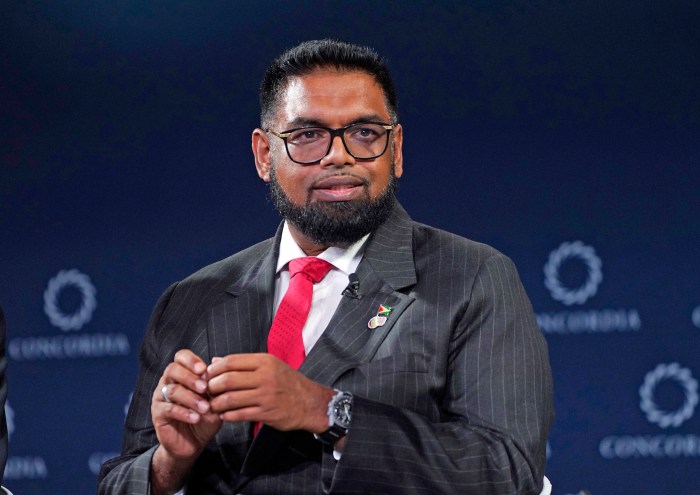A huge debt is owed to filmmaker Bruce Paddington for the very important document he assembled for the Caribbean archives as producer-director of “Forward Ever: The Killing of a Revolution,” about the dramatic happenings that led to both emergence and implosion of the Maurice Bishop-led People’s Revolutionary Government in Grenada. Embarking on what he surely must have known would be no cakewalk of an undertaking, Paddington’s determination to burrow into what drove this extraordinary chapter of Caribbean social evolution yields much that conceivably enhances understanding of the flow of events. Even so, Paddington revealed, after the New York premiere screening of the film recently, that his attempts to secure interviews with Bernard Coard and Hudson Austin had so far been fruitless. One hopes that such key constituents of the tapestry will not long remain excluded, to further enrich the work.
Coard was of course the deputy prime minister in Bishop’s leadership team who tends to get much of the blame for the chaotic goings-on that culminated in the execution of Bishop and others in October 1983. One commentator suggests in the film that the number one reason for the revolutionary government’s collapse was Coard’s “blind personal ambition” to become its leader and his failure to appreciate that this wasn’t a view shared by the people. Austin was the military leader who evidently chose to stand with the party faction opposing Bishop.
Revisiting the narrative even all these years later, it’s clear that the surreal quality of Grenada’s brush with revolution has in no way diminished. It is still very pertinent to ask: Was this unfolding drama really set in the English-speaking Caribbean? Beginning with the New Jewel Movement (NJM) seizing power from Eric Gairy in 1979, there would forever be lingering doubt, whether the people of Grenada, given their indoctrination, could become fully comfortable with the governance model that was the declared preference of Bishop and company. Gairy being by then seen as “an embarrassment to Grenada,” as someone notes in the film, transitioning to the NJM option was easy enough when the page was first turned. With time, though, and certain facets of this radical prescription for social change becoming living reality, would come the inevitable second guessing from some quarters.
One observer was probably reflecting the sentiments of many fellow nationals when she remarked that, because of the “massive support” Bishop enjoyed when Gairy was ousted, had he called an election at that time, he would have been “legitimately in government for five years.” The inference being that the process that was instead chosen by Bishop and the NJM wasn’t exactly a choice to which a substantial enough number of Grenadians gave sanction. A different read, naturally, from Bishop, his colleagues and their supporters. Theirs was the practice of “grassroots democracy,” they insisted, in which decision making power was enjoyed by “the people.” Bishop evidently spared no effort to underscore how much the People’s Revolutionary Government was about true proletarian power.
With every revolution, Bishop explains to his flock, comes the need to be alert to forces of counter-revolution. Quite expectedly, others felt that, as an attempt to justify what they saw as clearly undemocratic practices, the “counter-revolution” line didn’t fly. Not for the group which attempted to publish a newspaper when there was no “independent” publication existing. and saw their operation shut down after two issues. Not by those appalled by the many persons (rumored to be thousands) detained. That it was all in the interest of “national security” was, again, not a cocktail everyone was prepared to drink.
Given all of which, how ironic that it was from within the very NJM that fissuring developed that caused the government’s downfall and the mayhem that attended it. What was the spark? More than one central participant, we learn, claim to have forewarned Bishop of a growing undercurrent of opposition to his leadership, in which both Coard and his wife Phyllis, also prominent in the governing crew, were key – an undercurrent to which Bishop was not attuned, says one ally, and worse, brushed off as non-existent.
One suspects that by the time the situation morphed to where a shared-leadership arrangement with Coard was being proposed to Bishop, the spiral was probably irreversible. Setting the stage for the general misdirection that ensued. So much so that the film’s probing of the source of any order issued for Bishop and his associates’ elimination yields nothing definitive. What we do know, of course, is that a very avoidable descent into anarchy created a picture-perfect scenario for the extra-territorial involvement that wiser heads would instinctively have deplored, yet couldn’t but pragmatically appreciate. American military input, Dominica’s Eugenia Charles is heard to say, wasn’t something the U.S. imposed, but response to a request from Grenada’s neighbors.
So, had things not spun out of control and facilitated the demise of a charismatic leader, what then? Would Grenada have acclimated itself fully to the culture of “comrade,” “comrade leader,” “Central Committee” and such? More than likely not, we would wager. Calypsonian Brother Valentino, though, wasn’t about to validate power misplaced: “Grenadians in the region/Can no longer talk revolution/ Because of Bernard Coard/ And Hudson Austin the warlord/ They turn a dream into a nightmare/ Before we could celebrate the fifth year/Of a revolution this world was looking upon.”






















